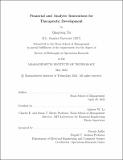Financial and Analytic Innovations for Therapeutic Development
Author(s)
Xu, Qingyang
DownloadThesis PDF (5.112Mb)
Advisor
Lo, Andrew W.
Terms of use
Metadata
Show full item recordAbstract
Despite groundbreaking advances in biomedicine over the past decades, the process of developing novel drug candidates from laboratory discoveries to safe and effective therapeutics approved by the Food and Drug Administration (FDA) has become longer, more expensive, and less likely to succeed. As a result, there is a widening gap in financing the clinical development of novel drug candidates, preventing potentially effective therapies from reaching the patients who are direly in need for a cure. This thesis proposes financial and data analytic innovations to address four important and challenging aspects of drug development.
We begin with an overview of the financial challenges in novel drug development and the strategies proposed to improve the financial efficiency in I. In Part II, we apply the "megafund'' portfolio approach of financing novel drug developments to two disease areas: glioblastoma therapeutics and mRNA vaccines for emerging infectious diseases. By calibrating the simulation parameters with inputs from domain experts, we find a sharp contrast between the risk/return profiles of the two megafunds. While the megafund for glioblastoma achieves an attractive rate of return and net present value for the investors, the megafund for mRNA vaccines is unlikely to generate financial value mainly because the limited revenue of vaccine sales is insufficient to recover the significant cost of conducting late-stage clinical trials. The intrinsic limitation of the vaccine development business model motivates more cost- and time-efficient clinical trial designs discussed in Part III.
Next, in Part III, we propose a novel clinical trial design which combines Bayesian decision analysis and epidemic modeling to accelerate the clinical testing of anti-infective therapeutic candidates during a rapidly evolving epidemic outbreak. The Bayesian optimal sample size of the clinical trial decreases when the disease is more infectious and deadly, and the corresponding optimal Type I error of FDA's decision increases. In addition, we apply Bayesian decision analysis to analyze whether the clinical evidence of a controversial phase 2 clinical trial for amyotrophic lateral sclerosis justifies FDA approval, by balancing the FDA's need to limit adverse medical effects and the patients' need for expedited access to a potentially effective therapy.
In Part IV, we investigate novel machine learning models and statistical techniques to estimate key parameters of the drug development process, including the probability that the drug candidate will receive FDA approval, the duration of clinical trials, and the correlation between clinical trial outcomes. We show that there is significant bias in the machine learning models trained on the imbalanced dataset of historical drug development outcomes. We also show that debiasing the machine learning model improves the prediction accuracy and generates financial value for the drug developer.
Finally, in Part V, we analyze two social and ethical issues of the drug development process. We illustrate the success and challenges of a disruptive pricing strategy for an osteoporosis drug, including a perverse incentive of certain health plans to favorably cover drugs with higher prices in exchange for higher rebates from the drug manufacturer. We also review the ethical controversy of using the human challenge trial (HCT), in which healthy participants are actively inoculated with the pathogen, to accelerate therapeutic development for COVID-19. We call for the wider use of quantitative modeling to assess the risk/benefit tradeoff and the proactive establishment of ethical criteria so that future HCT may be conducted with minimal delay.
Date issued
2022-05Department
Massachusetts Institute of Technology. Operations Research CenterPublisher
Massachusetts Institute of Technology